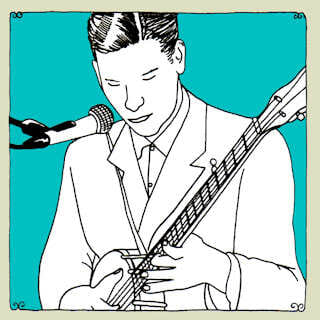- Welcome to Daytrotter
- Bo Weevil
- Cannonball
- Chilly Winds
- The Girl I Left Behind
- When The Roses Bloom Again
Frank Fairfield is hard to speak to. He is consumed with a feeling that most of us cannot speak to. We cannot get to it for we can only imagine a very loose-fitting replication of that place where he lives. He lives in Los Angeles, California, sure, but it’s full of fakers. It’s full of make-believe and of highly-paid professional and amateur actors struggling to figure out what their motivations are in getting to the heart of the character they’re trying to play in front of the watchful cameras. Fairfield is not of that part of LA, where Hollywood spoils things into a constructed farce whose goal is to be profitable and quotable first and foremost. This fey man, with a slightly hunched back and a bony handshake, to go with his Dapper Dan pomaded hairstyle, comes from a time that none of the living have ever seen. It exists more than a century again, a time that no person alive today ever saw. The oldest man alive is a young buck in Fairfield’s dated and antique gaze. The jackets and trousers that he wears seem to be of the Civil War era and he’s not thinking contemporary thoughts. He knows nothing of modern worries. In his head, even though he must know different, coffee costs a quarter and a gallon of milk is a dime. A four-course meal is expensive at $5 and horses and buggies are all the rage. With him, there is no denying that time has stood still for a long, long time. His mind hasn’t moved beyond the days when life expectancies were considerably lower and therefore life more tragic and desperate. The hard toil of days, the hard work of getting everything to work for you – love, food on the table, a roof over heads and death not arriving until you were ready – is fastened to Fairfield’s very specific sound. His is the sound of a man relying on old practices, of being live in one room with a cheap microphone and the idea that one take will do it. He embodies more the purpose of a recorded piece of music when they were first made – as a chance to hear a performer do exactly what they did live because traveling to everywhere was not an option. His self-titled album from last year is a gritty and rough take on the pride and tiredness of a good and faithful, god-fearing man and the pains of living. These are simple, but unbelievably true to the grain ballads of lesser times, but of more wholesome times, when things were cleaner, harder and in many ways more appealing because of it. Fairfield’s voice and his stories of sorrow seem to come from the grave. They seem to bound – actually amble – from the dirt, pulling their legs from the soil and shaking the brown specks of earth out of the cuffs at the bottom of the pant legs. The earthworms have chewed holes through his already spotty stockings and all of the rest of him is decades upon decades past being out of date. He sings about coming home to his woman with $10 in his pocket and having the act be enough to suddenly get her to not call him a dog anymore, but become grateful for the hard week’s work and the modest earnings that he makes. It’s enough to keep the biscuits in the oven and the eggs in the pantry – not to mention clothes on the kids’ backs. Fairfield is such an intriguing writer and performer, one who doesn’t take anything of late into account. The newspapers that are printed and thrown onto the stoops every morning must seem so foreign to him, as if they were written by H.G. Wells – the work of a hoax, one of a far-off time that seems implausible, with issues unfathomable. His songs work as easy medicine, a glance into the mind of the long gone past, when most of the country was still wild and rich with unfound gold, majestic scenery in every direction, plentiful and roaming bison herds and with land uncharted to the west. It’s a body of work that’s intrigued with the thought that we don’t have to be of this era. We can live elsewhere, in a time when are great grandparents weren’t even a glimmer in their mother or father’s eyes.
